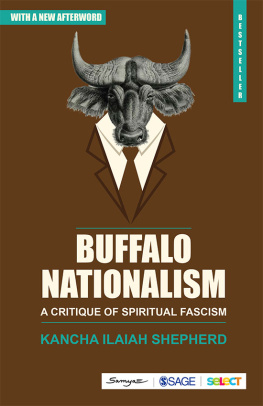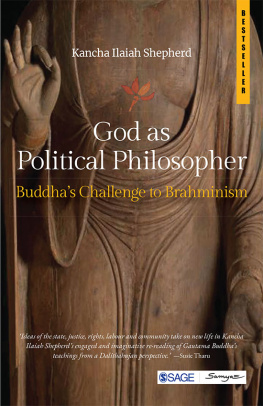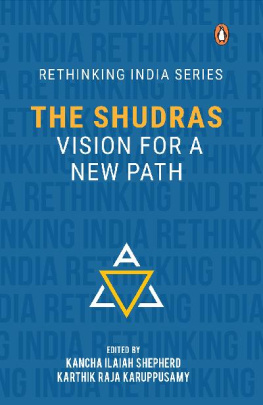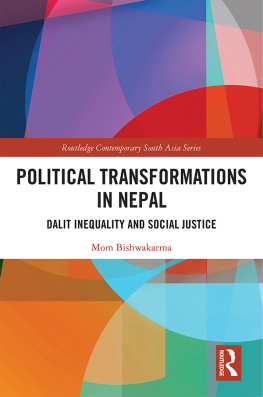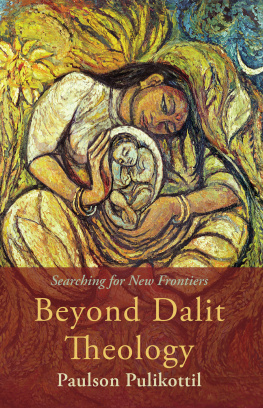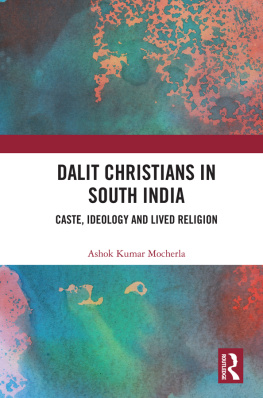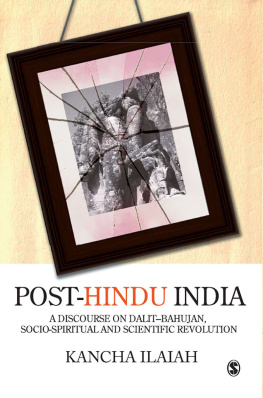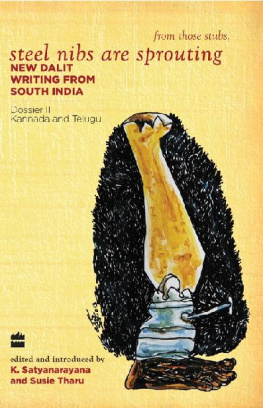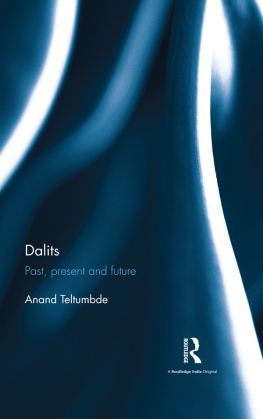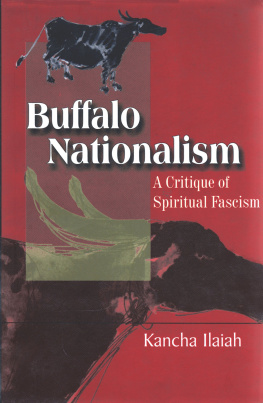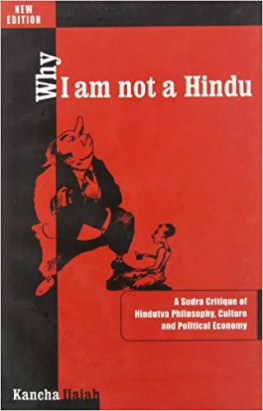
SAGE was founded in 1965 by Sara Miller McCune to support the dissemination of usable knowledge by publishing innovative and high-quality research and teaching content. Today, we publish over 900 journals, including those of more than 400 learned societies, more than 800 new books per year, and a growing range of library products including archives, data, case studies, reports, and video. SAGE remains majority-owned by our founder, and after Saras lifetime will become owned by a charitable trust that secures our continued independence.
Los Angeles | London | New Delhi | Singapore | Washington DC | Melbourne
BUFFALO
NATIONALISM
By the Same Author
Why I Am Not a Hindu: A Sudra Critique of Hindutva Philosophy, Culture and Political Economy (1996; rev. ed., 2005)
God as Political Philosopher: Buddhas Challenge to Brahminism (2000)
Post-Hindu India: A Discourse in Dalit-Bahujan, Socio-Spiritual and Scientific Revolution (2009)
Untouchable God: A Novel (2013)
From a Shepherd Boy to an Intellectual: My Memoirs (2018)
BUFFALO
NATIONALISM
A CRITIQUE OF SPIRITUAL FASCISM
KANCHA ILAIAH SHEPHERD
Copyright Kancha Ilaiah Shepherd, 2019
All rights reserved. No part of this book may be reproduced or utilised in any form or by any means, electronic or mechanical, including photocopying, recording, or by any information storage or retrieval system, without permission in writing from the publisher.
First published by SAMYA, an imprint of Bhatkal and Sen, 16 Southern Avenue, Kolkata 700026, in 2004; reprinted 2004, 2007, 2012, 2018.
This edition published in 2019 by

|
SAGE Publications India Pvt Ltd B1/I-1 Mohan Cooperative Industrial Area Mathura Road, New Delhi 110 044, India www.sagepub.in | Samya 16 Southern Avenue Kolkata 700026 www.stree-samyabooks.com |
SAGE Publications Inc 2455 Teller Road Thousand Oaks, California 91320, USA |
SAGE Publications Ltd 1 Oliver's Yard, 55 City Road London EC1Y 1SP, United Kingdom |
SAGE Publications Asia-Pacific Pte Ltd 18 Cross Street #10-10/11/12 China Square Central Singapore 048423 |
Published by Vivek Mehra for SAGE Publications India Pvt Ltd, typeset in 10/12 pts Casablanca by Zaza Eunice, Hosur, Tamil Nadu, India.
Library of Congress Cataloging-in-Publication Data Available
ISBN: 978-93-532-8257-8 (ePub)
SAGE Samya Team: Amrita Dutta, Guneet Kaur and Aritra Paul
To all those who have suffered apartheid, untouchability,
casteism, patriarchy and brutal atrocities because of
spiritual fascism. To all those who fought, wrote and dedicated
themselves for their liberation. Liberation in this world
is more important than salvation in heaven.
Thank you for choosing a SAGE product!
If you have any comment, observation or feedback,
I would like to personally hear from you.
Please write to m e at
Vivek Mehra, Managing Director and CEO, SAGE India.
Bulk Sales
SAGE India offers special discounts
for purchase of books in bulk.
We also make available special imprints
and excerpts from our books on demand.
For orders a nd enquiries, write to us at
Marketing Department
SAGE Publications India Pvt Ltd
B1/I-1, Mohan Cooperative Industrial Area
Mathura Road, Post Bag 7
New Delhi 110044, India
E-mail us at
Subscribe to our mailing list
Write to
This book is also available as an e-book.
Contents
My thanks are due to many institutions, organizations and individuals, who have helped and encouraged me in the course of writing these articles for many newspapers and journals in India. But for the willingness of many editors who allowed me to write, that too in a manner that I wanted to write, which often went against their papers policy, many of these pieces would not have been written at all. Of course, such writing was/is being allowed or asked for because there is a new readership that has emerged from the social womb of Dalit-Bahujans that wants to see its own image in contemporary media. A writers role in a social movement is to reflect its newly made up face and see whether it changes the market value of the mirror itself. But for the positive encouragement of socially sensitive editors like Malini Parthasarathy of The Hindu, A. T. Jayanti of the Deccan Chronicle and my journalist friends like R. Akhileswari, the editor K. N. Shantha Kumar and associate editor A. V. Namboodiri, all of the Deccan Herald perhaps the only OBC-controlled English newspaperI would not have written these articles. I thank them for their support. The late Krishna Raj, editor of the Economic and Political Weekly encouraged my contributions. I deeply regret his untimely death. Sumit Chakravartty of Mainstream also published my writings. I have indeed been fortunate in my association with both these distinguished journals.
The journey of my writing continues. A new essay, Where Are the Sudras? was published by The Caravan, October 2018. I thank the journal for readily agreeing to let me add the essay to this collection as an Afterword, as it encompasses the path I have taken since I wrote this book in 2004.
Sometimes some papers close their doors while other new ones open theirs. These encounters of pain and pleasure within the world of the media are part of a writers life. When a writer challenges the world of the press owners caste and class, these problems increase. Rejection of articles, abusive attacks from the anti-Dalitbahujan readers follow. If a news-paper publishes my article, I enjoy seeing and reading it like a child enjoys playing with a doll that its own hands have made. I have also received irrevocable rejections. Each has made me stronger rather than weaker. I am thankful to those editorial staff who edited my articles in these newspapers and journals as they improved their readability. I also thank those who rejected my articles as this strengthened my nerve.
After my book Why I am Not a Hindu: A Sudra Critique of Hindutva Philosophy, Culture and Political Economy was published in 1996 (Samya), several reviews appeared and some of the editors of leading national newspapers were willing to publish my opinions on many current issues. Aakar Patel of Mid-Day told me that the book was a modern classic and asked me to write for him. I thank him for the opportunity to do so. I cannot forget the sudden phone call from Malini Parthasarathy, the then executive editor of The Hindu, an English national daily, of one of the largest circulations. She asked me to contribute to The Hindu particularly to their 50 Years of Independent India special issuein an autobiographical tone, tracing the events in independent India. I did so. That was the beginning of my intellectual engagement with that paper. I thank her for not only publishing many articles, for publishing several critical letters and also for putting up with many abusive letters as well.
In a brahminical environment, publishing my critique of Hinduism in a paper named The Hindu was certainly a tricky proposition and she did so with courage and conviction. As one of the boldest woman journalists in India she took the initiative to publish caste-related issues and put them up for debate in this country of the casteist elite. The RSS and its sister organizations took up a campaign not only against me but also against all my supporters in the media. Quite interestingly, many of my strong supporters in the media turned out to be women irrespective of their caste background. My publisher Mandira Sen took the initial risk. Then Malini Parthasarathy, A. T. Jayanti, Sagarika Chose, Burkha Dutt (who put me on the NDTY network time and again), Gita Ramasamy (the publisher of my books in Telugu) all happen to be women. This put a major burden on me of continuing the Phule, Periyar and Ambedkar tradition of the liberation agenda of women along with the liberation of Dalit-Bahujan social forces from caste, gender and class oppression as that is a three-in-one mission of mine too.
Next page
